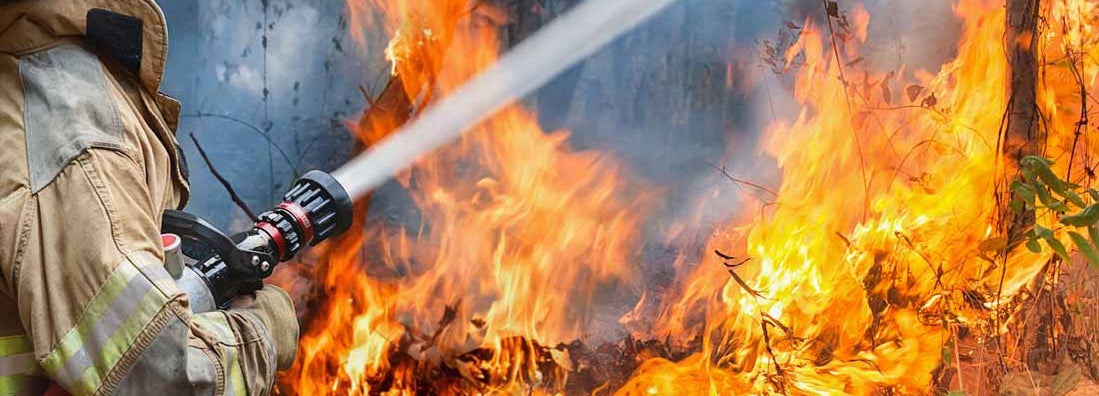Utah Fire Insurance
Independent agents in Utah shop multiple companies to get you the best price on fire insurance.

Fires can be extremely destructive. A fire in your home, business or even your vehicle can cause insurmountable financial losses unless you have fire insurance coverage for your Utah property. There are many ways that a fire can accidentally be started, from accidents while cooking, to unattended candles or cigarettes. Protect your family by installing a sufficient number of smoke detectors and fire extinguishers in your home, and by having evacuation plans in place in the event that a fire does start. Also, protect your finances by making sure that you have a sufficient amount of fire insurance covering your property. You may want to start by comparing quotes for this coverage.
Use our independent agent matching system to find the best insurance plan in your area. You tell us what you’re looking for, and our technology will recommend the best agents for you. Any information you provide will be sent to only the agents you pick. We do not sell to third parties.
Recent UT Department of Public Safety Fire Statistics
- There are 273 fire departments in the state of Utah
- Utah firefighters responded to 4,993 fires
- Of these, 1,274 were structure fires and 702 were vehicular fires
- These fires resulted in 75 injuries and 7 fatalities
- Fires in Utah caused $105,243,433 in property loss and damage during that year
What Is Fire Insurance?
Fire insurance is a specialized form of property coverage that is designed to reimburse you for the costs associated with the reconstruction, repair or replacement of your property if it is damaged by a fire. This insurance is not something you purchase as its own policy; rather, it is typically included in the insurance policies you already have. If you have a home, business, or car insurance policy, there is a good chance that you have coverage against fire damage.
Be sure to review your currently-held policies carefully to ensure that you are properly covered against fire damage and that the coverage you have is adequate in the event that a fire causes a total loss. If your policy does not provide sufficient coverage, you may want to consider increasing your coverage limits or shopping for a better insurance policy.
Fire Insurance Covers Damages to Your Utah Home
Most residential fires are minor and cause minimal damage to the home and property. However, a fire can get out of control quickly and, if it does, the destruction can be all-encompassing. According to State Master, recent residential fires in Utah have resulted in an average of $6,928 in damages. It doesn’t matter whether you own or rent your home. You are able to get fire insurance to cover your personal property. The type of dwelling you live in and your ownership status will dictate what type of policy you will need to get coverage against fire damage. The different types of policies Utah residents can use to cover their domestic property include:
- Homeowners insurance: Designed to cover traditional and manufactured houses, these policies can provide you with coverage for both the structure of your home and the contents kept inside. You may need to purchase additional riders, or endorsements, to fully cover any exceptionally expensive property you may have, such as jewelry or original artwork.
- Condo insurance: As a condo owner, you can rely on your condo association’s master policy to provide coverage for the structure of your building, and your individually-purchased condo insurance policy to cover the items within your unit. As with homeowners insurance, you may need to purchase additional endorsements in order to cover your more valuable items.
- Renters insurance: Renters insurance policies are inexpensive and will enable you to cover the property you own within your rental home. You will need to be sure to purchase coverage in a sufficient amount to fully cover your personal belongings, including such things as furniture, electronics, and clothing.
- RV insurance: Because they serve as temporary homes, it is likely that you keep a lot of personal property inside your RV. Recreational vehicles have unique fire risks because they can suffer fire damage as the result of an overheated engine, a motor vehicle accident, or while parked and serving as a home. A suitable RV insurance policy should provide fire insurance coverage for all of the ways that your motorhome may be affected by this type of disaster.
Fire Insurance Covers Damages to Your Utah-Based Business
If you are a business owner, fire insurance may be necessary to protect the investment you have made in supplies, furnishings, computers, and inventory. Therefore, a business insurance policy, which will include fire damage coverage, is strongly recommended. If your business is home-based, your homeowners insurance policy may provide some coverage, but several insurance companies will require you to purchase a business rider in order to be eligible for coverage against fire damage to your business equipment.
You can further protect your Utah-based business from fire-related losses by including income continuation or business-interruption coverage as part of your policy. With this coverage, if your business is forced to temporarily close or cease operations while fire damage is being repaired, you can still receive business income that will enable you to pay your creditors and salaried employees until normal operations can be resumed.
Fire Insurance Covers Damages to Your Vehicle
According to the U.S. Fire Administration, most vehicular fires are the result of a mechanical failure. Approximately 61 percent of all highway vehicle fires originate in the engine, running gear or wheel area of the vehicle. If your vehicle catches on fire as the result of an accident, your collision insurance, or the insurance of the at-fault driver, is likely to cover the damages. However, if the fire is non-collision related—such as if the vehicle is parked in the garage of a burning building—you will need comprehensive insurance to get compensated. Utah’s minimum auto insurance requirements include liability coverage only. Therefore, if you decide to save money by buying a policy that only meets the state requirements, you will not have comprehensive coverage.
Comprehensive insurance, also known as “other than collision” insurance, is designed to cover damages sustained by your vehicle when it is not in use. If you have financed the purchase of your car or truck and are still making payments, it is likely that you already have comprehensive insurance, as this coverage is typically required by financing companies. However, if your vehicle is paid for, this coverage is optional. If you have been thinking about adding it to your policy, it is a good idea to compare a variety of quotes from different insurers to make sure that you are getting this added coverage at a competitive rate.
Get Help Obtaining Fire Insurance Quotes in Utah
If you need help understanding your fire insurance coverage, you can turn to one of the many independent insurance agents in our network. These agents can help you review the fire coverage you already have in your currently-held insurance policies. If there are deficiencies in your coverage, your agent can help you find and compare competitively-priced policies that can meet your coverage needs. Several local agents have offices right here in Utah.
Contact an agent near you to get more information and to start reviewing fire insurance quotes.
